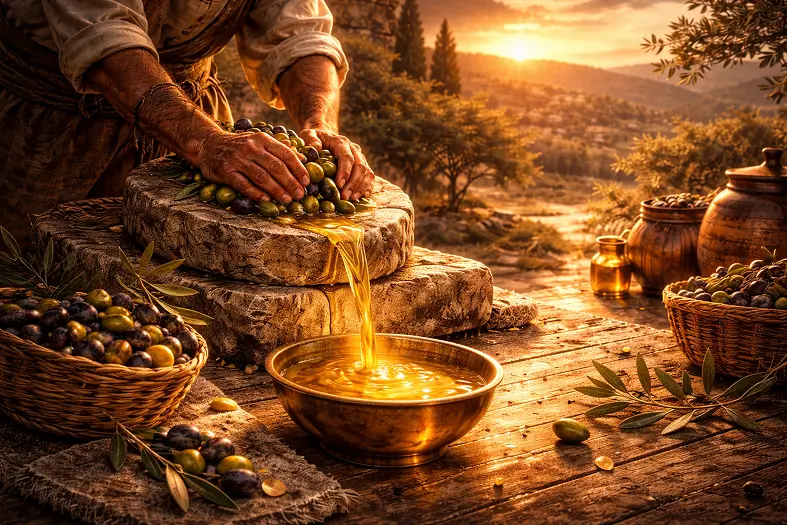


We are commanded to prepare the sacred anointing oil (Shemen HaMishchah) according to the Torah’s exact formula.
This mitzvah commands the preparation of the Shemen HaMishchah, the holy anointing oil described in the Torah (Shemos 30:22–33). It was a unique compound of olive oil blended with specific spices—mor deror (myrrh), kinamon (cinnamon), kaneh bosem (aromatic cane), and kidah (cassia)—prepared in precise measurements and sanctified for sacred use alone.
The Torah states that Moshe Rabbeinu prepared this oil, and it was used to anoint the Mishkan, its vessels, and the Kohen Gadol (Shemos 30:26–30). In later generations it was used to anoint kings from the Davidic line when anointing was required (Horayos 11b). The oil did not merely “mark” an object or person; it consecrated—declaring that this vessel, this place, or this leader is now devoted to avodas Hashem.
The Torah also places severe boundaries around this sanctity: it is forbidden to compound an identical oil for personal use, and forbidden to apply it to a non-authorized person (Shemos 30:32–33). The Shemen HaMishchah teaches a fundamental yesod: kedushah is not inspiration alone; it is designation, discipline, and separation for Hashem.
Rambam
Sefer HaChinuch
Rashi
Talmud
Ramban
Midrash & Chazal
Acharonim & Modern Torah Giants
Chassidic & Mussar Classics
Contrast
Parallel
Kedushah Requires Separation
Precision Is a Form of Yiras Shamayim
Give the First Portion to Hashem
Pressure Can Refine Rather Than Break
Leadership Must Be Consecrated
Guarding the Holy From Imitation


Represents the concept of spiritual intentionality, purity, and sanctity—set apart for a higher purpose.
Concerns the Beit HaMikdash, korbanot (offerings), and priestly service.
Tied to the eternal covenant between G‑d and the Jewish people, including signs like brit milah and Shabbat.
Signifies awe and reverence toward Hashem—living with awareness of His greatness and presence.
Associated with belief in and obedience to G‑d’s prophets, as well as reverence for their role in transmitting Divine truth.
Mitzvot that define and deepen the relationship between a person and their Creator. These include commandments involving belief, prayer, Shabbat, festivals, sacrifices, and personal holiness — expressions of devotion rooted in divine connection.

Dive into mitzvos, prayer, and Torah study—each section curated to help you learn, reflect, and live with intention. New insights are added regularly, creating an evolving space for spiritual growth.

Explore the 613 mitzvos and uncover the meaning behind each one. Discover practical ways to integrate them into your daily life with insights, sources, and guided reflection.

Learn the structure, depth, and spiritual intent behind Jewish prayer. Dive into morning blessings, Shema, Amidah, and more—with tools to enrich your daily connection.

Each week’s parsha offers timeless wisdom and modern relevance. Explore summaries, key themes, and mitzvah connections to deepen your understanding of the Torah cycle.